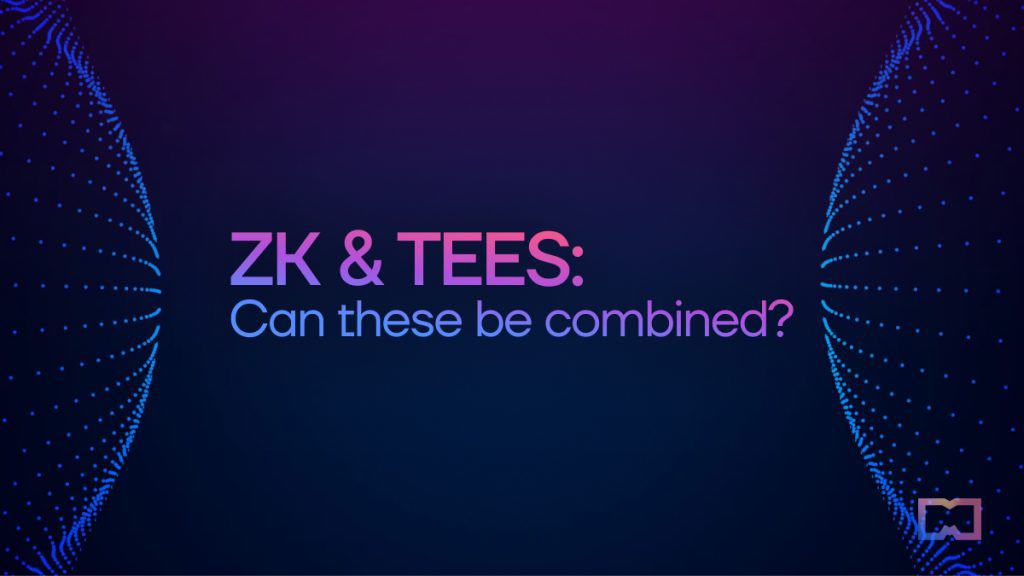ZKPs & TEEs: Can These Be Combined?


Trusted Execution Environments (TEEs) and Zero-Knowledge Proofs (ZKPs) are both security technologies, but they serve different purposes and have unique characteristics. Here, we look at both, discuss their main features and explore how they could be combined to create powerful solutions.

What are TEEs?
TEEs provide a secure environment for processing and storing sensitive data, ensuring data confidentiality and integrity even in potentially untrusted systems. In order to do so, they leverage hardware-based isolation to create a separate, protected area within a device’s processor. This secret area, also known as a secure enclave, allows sensitive operations to be executed without exposing the data to other parts of the system, including the operating system and other applications.
TEEs are commonly used for secure data processing, digital rights management, cryptographic key management, secure code execution, authentication, and privacy-preserving analytics. ARM TrustZone, Intel Software Guard Extensions (SGX), and AMD Secure Encrypted Virtualization (SEV) are examples of TEE technologies.
What are ZKPs?
Zero-Knowledge Proof (ZKP) is a cryptographic technology that has gained a lot of traction with the rise of blockchain development, namely the areas of cryptocurrency, and DeFi as a way to enhance security. It allows one party (the prover) to prove to another party (the verifier) that a statement is true, without revealing any information about the statement itself, other than its validity.
ZKPs rely on cryptographic techniques to create mathematical proofs that demonstrate the truth of a statement without revealing the underlying data or the details of the statement – they are often used in privacy-focused blockchain networks, secure authentication systems, privacy-preserving data sharing, and secure multi-party computation.
zk-SNARKs (Zero-Knowledge Succinct Non-Interactive Argument of Knowledge) and zk-STARKs (Zero-Knowledge Scalable Transparent ARguments of Knowledge) are examples of ZKP implementations.
Techs in Context
Both Trusted Execution Environments (TEEs) and Zero-Knowledge Proofs (ZKPs) offer unique benefits and have promising potential in various applications. Determining which technology is more promising depends on the context and the specific requirements of a given use case.
TEEs are particularly promising for scenarios where secure data processing and storage are critical. They provide hardware-based security and isolation, which can be particularly valuable in cloud computing, IoT devices, and mobile devices. TEEs are already being used in a range of applications, including secure data processing, authentication, digital rights management, and secure firmware updates. Their continued adoption is expected to enhance security and privacy in various industries.
On the other hand, ZKPs can come in handy for applications requiring privacy-preserving proof of information without revealing the actual data. ZKPs have the potential to revolutionize privacy and security in areas such as blockchain, secure authentication, data sharing, and secure multi-party computation. The development of more efficient and scalable ZKP implementations, such as zk-STARKs and zk-Rollups, is paving the way for broader adoption of this technology.
Both TEEs and ZKPs have their own strengths and areas of application. While TEEs provide hardware-based security and isolation for secure data processing, ZKPs enable privacy-preserving proofs without revealing underlying data. Each technology will continue to be significant and promising in its respective domains, and in some cases, they can even be combined to provide enhanced security and privacy in certain applications.
Can TEEs & ZKPs be combined?
Combining Trusted Execution Environments (TEEs) and Zero-Knowledge Proofs (ZKPs) can provide enhanced security and privacy in certain applications, by leveraging the strengths of both technologies. Here are some scenarios where TEEs and ZKPs can be combined:
- Privacy-preserving data processing: TEEs can be used to securely process sensitive data, while ZKPs can be employed to generate proof about the processed data without revealing the actual information. This allows users to prove certain properties of their data without disclosing the data itself.
- Blockchain and confidential transactions: In privacy-focused blockchain networks, TEEs can be used to securely process transactions, while ZKPs can be employed to generate proof of the validity of the transactions without revealing transaction details. This enables confidential transactions and maintains privacy within the network.
- Secure multi-party computation (SMPC): SMPC allows multiple parties to collaboratively compute a result without revealing their individual inputs. TEEs can be used to securely execute the computation, while ZKPs can provide proof of the correctness of the computation, ensuring that each party’s input remains private.
- Privacy-preserving machine learning: In cases where sensitive data is used for machine learning purposes, TEEs can be used to securely train and execute machine learning models, while ZKPs can be employed to generate proofs about the model’s accuracy or properties without exposing the underlying training data or the model itself.
- Secure voting systems: TEEs can be used to securely process and store votes, while ZKPs can be employed to generate proof about the validity of the votes and the final election results without revealing individual votes or voter identities, ensuring privacy and security in the voting process.
By combining TEEs and ZKPs, developers can leverage the benefits of secure data processing and privacy-preserving proofs to create applications and services with enhanced security, privacy, and trust.
While there are no widely known implementations that specifically combine TEEs and ZKP at the moment, there are projects and initiatives exploring the potential of combining these technologies or being inspired by their principles. One example is:
MobileCoin: MobileCoin is a privacy-focused cryptocurrency designed for mobile devices. It uses Intel SGX (a type of TEE) to securely process transactions and employs cryptographic techniques inspired by ZKPs to ensure transaction privacy. While not strictly using ZKPs, it showcases the potential of combining TEE-based transaction processing with privacy-preserving cryptography.
Integritee: Providing Private, Secure & Verifiable Processes
Integritee offers the best of both worlds without using ZKP to issue proof of correctness or validity: our L2 solution – sidechains connected to the L1 mainnet – allows you to go incognito and process information in a scalable and private way, with the added value of also providing proof of said action. This means you won’t need to resort to ZKPs to get proof of validity nor of any other kind, as our network enables that function.
Our sidechains are built in Intel SGX Trusted Execution Environments, which means all the data that goes on them is kept private. Intel’s TEEs are fitted with remote attestation service, thus allowing clients to get proof of execution – it won’t include the processed data, just a confirmation that what you processed was, indeed, what you want to be processed. We are soon releasing our decentralized remote attestation service, called the Attesteer: relevant to TEE users who want to benefit from public auditability while using a privacy-based network that allows for the secure processing of sensitive data. You might need to prove to collaborators or third parties that you successfully completed a certain task without disclosing private data of such task, so this would be a great way to do so.
Read more:
Disclaimer
In line with the Trust Project guidelines, please note that the information provided on this page is not intended to be and should not be interpreted as legal, tax, investment, financial, or any other form of advice. It is important to only invest what you can afford to lose and to seek independent financial advice if you have any doubts. For further information, we suggest referring to the terms and conditions as well as the help and support pages provided by the issuer or advertiser. MetaversePost is committed to accurate, unbiased reporting, but market conditions are subject to change without notice.


Co-Founder & CEO Integritee | Entrepreneur | Advisor | Board Member













